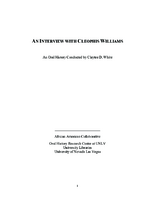Search the Special Collections and Archives Portal
Search Results

Transcript of interview with John Graves by Hank Baran, March 1, 1987
Date
Archival Collection
Description
On March 1, 1987, Hank Baran interviewed John Graves (born February 21st, 1938 in San Diego, California). This interview covers the gaming industry overall, and also highlights, women in gaming, more specifically. Mr. Graves also discusses the hotels on the Las Vegas Strip, McCarran Airfield, and golfing in Southern Nevada.
Text

Transcript of interview with Colleen Gregory by Tim Waters, April 6 & 7, 1976
Date
Archival Collection
Description
On April 6 and 7, 1976, Tim Waters interviewed Colleen Gregory (born 1928 in Santa Clara, Utah) about her life in Southern Nevada. Gregory first talks about her original move to Las Vegas, her early education, school activities, and her college education. She also talks about the first banks, Helldorado, the atomic testing, and environmental changes. Other topics covered include Howard Hughes, Western-style influences, first properties on the Strip, World War II, racial prejudice, and changes she has noticed during her career in banking.
Text

Transcript of interview with Guy Hamblin by Barry Merrell, February 22, 1975
Date
Archival Collection
Description
On February 22, 1975, Barry Merrell interviewed former railroad worker Guy Hamblin (born 1896 in Clover Valley, Nevada) in his home at 4306 Kay Place, Las Vegas, Nevada about the history of Southern Nevada. Specifically, the two discuss Hamblin moving from different towns in Nevada before settling down in Southern Nevada, viewing the above-ground atomic bomb tests, early Fremont Street, and his work on the railroad. In addition, Hamblin also discusses the demographic and economic changes that he has seen in Las Vegas.
Text

Jill Roberts oral history interview: transcript
Date
Archival Collection
Description
Oral history interview with Jill Roberts conducted by Barbara Tabach and Claytee D. White on March 20, 2018 for the Remembering 1 October Oral History Project. In this interview, Jill Roberts discusses her position as the CEO of the Trauma Intervention Program (TIP) of Southern Nevada. She also delves into her part-time work at the coroner's office as a death investigator and discusses her personal background in Las Vegas, Nevada after she moved to the city in 1977. She describes the role TIP had during the aftermath of the October 1, 2017 mass shooting, where well-trained volunteers were dispatched to hotels, hospitals, and anywhere else the survivors reached in order to provide emotional and practical support. Throughout the interview, Roberts emphasizes that the assistance provided to those in a traumatic event depends on each individual's needs. She shares a few examples of what the TIP volunteers had helped with after the shooting, including listening to the survivors' stories as well as providing information on the situation, helping separated loved ones find each other, arranging travel for some survivors to go back to their homes, and procuring clothes and shoes for those who needed them. Roberts also discusses the gratitude TIP had received after the shooting, including the thank you cards sent by Sandy Hook High School.
Text

Transcript of interview with Cleophis Williams by Claytee White, April 27, 2010
Date
Archival Collection
Description
In 1943, Cleophis Hill Williams was a teenager visiting her mother who had moved to Las Vegas. For most of her young life she had lived with her parents in Muskogee, Oklahoma and Paul Spur/Douglas, Arizona. The same year that she visited Las Vegas, she met her future husband Tom Williams, with whom she had nine children, all born and raised on the Westside. Tom worked construction and built their first home on G Street. For Cleophis, she focused her life on raising her children and, whenever possible, finding some precious time to read.
Text

Guadalupe Meza Redmond interview, December 7, 2018: transcript
Date
Archival Collection
Description
Interviewed by Claytee White. Rodrigo Vazquez also participated in the questioning. Guadalupe Redmond lived a wonderful life in Mexico while growing up. When Guadalupe was 17, her mother decided to immigrate the family to Las Vegas, Nevada, Guadalupe did not want to move but reluctantly did so. She taught herself English by watching TV. Then she decided she wanted to work and became a guest room attendant working downtown and on the Strip - Sundance (Fitzgerald's, now the D), Stratosphere, Aladdin, Planet Hollywood, Riviera, Hacienda - to name a few. As she moved about, she began to understand the importance of the Culinary Union Local 226. She is now an organizer who in 1989 participated in a 10-month Work and Walk strategy that was successful.
Text

Transcript of interview with Marian Beltran Decaro by Frank Murillo, March 27, 1977
Date
Archival Collection
Description
On March 27, 1977, Frank Murillo interviewed housewife Marian Beltran Decaro (born September 7th, 1914 in Flagstaff, Arizona) in her home in Las Vegas, Nevada. This interview covers the history of Las Vegas, Nevada’s first Mexican restaurant. Mr. Decaro is also present during the interview. Additionally, Mrs. Decaro recalls the first atomic bomb test in Las Vegas and also offers an overview of the growth of the area, overall, including the development and demographic details of such distinct historical communities as the Westside.
Text

Transcript of interview with Patricia Hesse by James M. Greene, February 5, 1975
Date
Archival Collection
Description
On February 5, 1975, James M. Greene interviewed Mrs. Patricia Hesse (born 1895 in Beaumont, Texas) in her home in Las Vegas, Nevada. The two discuss Hesse’s personal history and the general social life of early Las Vegas. Hesse also shares experiences that she has had with her friends while living in Las Vegas.
Text

Transcript of interview with Judge Abbi Silver by Barbara Tabach, January 10, 2017
Date
Archival Collection
Description
It is evident that a keen wit and persistent tenaciousness to protect victims of crime have earned Judge Abbi Silver the reputation that elevated her to her current position as Chief Judge of the Nevada Court of Appeals. She is the first female to hold this position. Judge Silver is a lifelong resident of southern Nevada. She was raised in Boulder City, where her family was the only Jewish family at the time. Her father was a doctor and eventually the family moved into Las Vegas, where she graduated from Clark High School and then University of Nevada, Las Vegas (1986). Always an overachiever, she worked multiple jobs?waitress, Utah Jazz cheerleader, dancer?while earning her undergraduate degree and then her law degree from Southwestern University of Law, in Los Angles (1989). In this oral history, Judge Silver recalls being a law clerk for Honorable Earle White, Jr., joining the Clark County District Attorney?s Office and being assigned as the Chief Deputy DA for the Special Victims
Text

Michael Ciccolo oral history interview: transcript
Date
Archival Collection
Description
Oral history with Michael Ciccolo conducted by Claytee D. White on September 18, 2018 for the Remembering 1 October Oral History Project. In this interview, Ciccolo, a doctor at Sunrise Hospital in Las Vegas, Nevada, discusses the early morning after the mass shooting on October 1, 2017. He participated in surgery for two victims in the early morning after the shooting. As a doctor trained in Iowa, Arizona, and California, Ciccolo and his family love the city of Las Vegas. He trained at the University of Iowa, University of Arizona, and University of Southern California. His thoughts after the October 1 tragedy include the belief that as a society, we are not grateful enough for everyday things. He also discusses anger, and his conflicting thoughts on gun ownership.
Text
